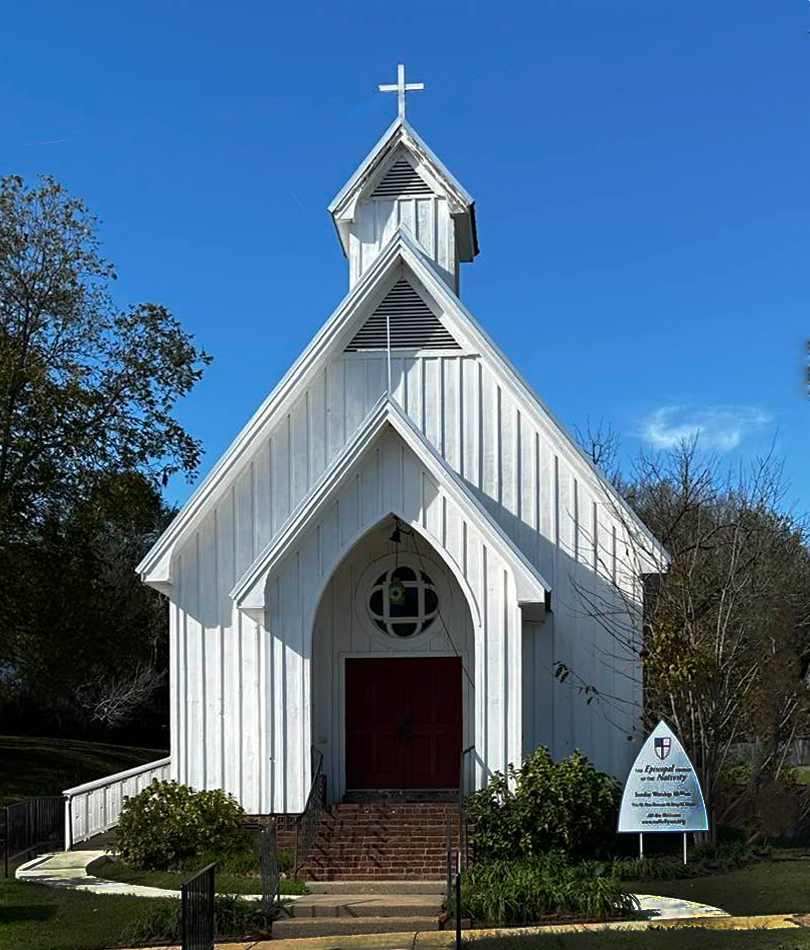Off and on, I have worshipped in one Episcopal Church or another. Episcopal services share something with Walmart and McDonald’s — they are always recognizably similar. Many times, I have watched the vicar bless the bread and wine and repeat these words:
“The Gifts of God for the People of God.”
Recently, I visited a small Episcopal church for the first time, and a book by the Reverent Furman L. Buchanan was available for visitors. As I have begun to read that book, I am happy that I was a visitor that day.

The Church of the Nativity, an Episcopal Church in Water Valley – My New Home Church
The day that I visited The Church of the Nativity in Water Valley, MS, I was hoping to reconnect with people who I felt would share many of my beliefs–and my hope for the future. I was seeking communion as described by the Reverend Furman Buchanan, who begins by discussing the time when Jesus met with his friends for the Last Supper:
“Taken together, the four Gospels explicitly identify only three things being present with Jesus and the disciples in that room—water, bread, and wine. On the night he was handed over to suffering and death, Jesus used the bowl of water to wash the feet of his friends. He broke the bread to feed his friends. And after supper, Jesus took the cup to celebrate with his friends. Celebrate? These are the first, simple gifts of communion—of togetherness in the light of God’s love —even when that light appeared as a dimly burning wick in a dark room filled with doubts, fears, and confusion. For two thousand years we have celebrated this event as the perfect picture of God’s love. The Holy Eucharist reveals God’s desire, through Christ, to be in communion with us despite everything that tears us apart.”
“The Holy Eucharist reveals God’s desire, through Christ, to be in communion with us despite everything that tears us apart.” – Buchanan
“Near the end of the New Testament is a letter to the Hebrews.”
Therefore the Lord himself will give you[ a sign: The virgin will conceive and give birth to a son and will call him Immanuel.Isaiah 7:14
” The writer explains that while God used to speak to our ancestors through prophets, there is a new means of revelation for us now—a Son who reflects God’s glory…a Son who is the exact imprint of God’s very being! Think about that for a moment. We used to have the words of the Law and the prophets, but now we also have the picture of Jesus. As the letter to the Colossians also says, “He is the image of the invisible God…”
13 For he has rescued us from the dominion of darkness and brought us into the kingdom of the Son he loves, 14 in whom we have redemption, the forgiveness of sins. Colossians 1:13-14
The Supremacy of the Son of God
15 The Son is the image of the invisible God, the firstborn over all creation. 16 For in him all things were created: things in heaven and on earth, visible and invisible, whether thrones or powers or rulers or authorities; all things have been created through him and for him. Colossians 1:15
Buchanan compares a recognition of Christ to that of developing a photograph — a process that requires darkness.
Darkness to Light
“Jesus—the exact imprint of God’s being—suffered in the darkness of human cruelty as the full portrait of God’s love came into focus. We have been given the courage to persevere in our own valleys of darkness by seeing more clearly that God does not do bad things to us. Rather, our God suffers bad things with us. Only after some time in the dark can you bring the print back into the light in order to see all the subtleties. We are blessed with many pictures of Jesus sharing the love of God, welcoming children and adults into his arms and blessing them. We have the subtleties in our own snapshots, too—knots in the golden pine boards and gaps between the baby teeth of radiant smiles. In all these images, we have the gift of joy and wonder in seeing God’s love.” Furman L. Burman
Discover more from Jacki Kellum
Subscribe to get the latest posts sent to your email.
